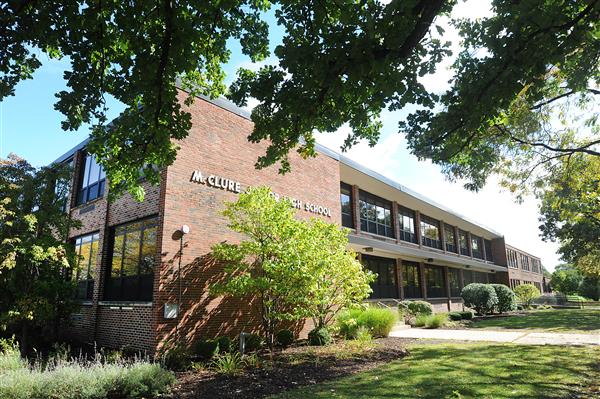McClure educates people on issues of mental health

The exterior of McClure Junior High, where the mental health information session was held.
March 18, 2019
McClure Junior High School hosted a meeting on Feb. 21 for parents and eighth graders to inform them about the current struggles of mental health in our society. Eighth grader Jack Sluis, was shocked about what he had learned. He had no idea that mental health affects as many people as it does. He didn’t know that many of his peers were fighting battles every day with their own mind.
“I have a lot of stress from school; more than other people and more than I should,” Sluis said. “On tests, if I don’t get a grade I wanted, I get really sad and angry about it.”
The meeting at McClure was called Ending the Silence and it is a National Alliance on Mental Illness (NAMI) program, McClure principal Dan Chick said. It encourages people to talk freely about the issues surrounding mental health.
People who have gone through struggles shared their stories of recovery at the meeting, Barb Barrett, presenter at the Ending the Silence meeting, said. It’s impactful for attendees because suffering does happen.
“It is important [for students to be educated in mental health] because it significantly helps them develop academically,” Sluis said. “[It’s also] important [because] it helps highlight the importance of mental health.”
This is the first year McClure has hosted an Ending the Silence meeting. In the future, Chick wants to have all grades, sixth through eighth, sit for the presentation, rather than only eighth graders and parents. Currently, principals from Gurrie, Pleasantdale, Park, and Highlands are working together to host as many informational nights for parents as possible.
“It is our hope that the more that people talk openly about mental health issues that the stigma associated with that will decrease,” Chick said. “The numbers/data on the number of students/kids that experience mental health issues is astounding so the more we talk openly about the issues, the more help and resources we can provide for our kids and parents.”
Barrett has been working at NAMI for three years. She also worked in an adolescent unit 30 years ago, and she worked at the Robert Crown Center for 12 years. Barrett has done programs for parents, caregivers, and kids as well. She piloted a self esteem program, and co-wrote and presented a self esteem campaign for beauty that was partnered with Dove.
“I am very transparent when I teach,” Barrett said. “I grew up with a mother who struggled with alcohol and my parents were divorced, so I felt very judged. I knew what it felt like to be isolated. I have a strong sense of empathy so I wanted to be part of making a difference for others.”
Everybody has mental health, and there is so much stigma about it, she said. Everyone struggles sometimes, and for some people, it gets more challenging. It’s okay and it’s nobody’s fault.
“Culture doesn’t embrace it like we need to,” she said. “It’s hard growing up now. There is tremendous pressure. [We need to] make failing acceptable. It’s okay to fail, it’s [actually] necessary.”
It’s normal to have a mental illness and we don’t need to attack the stigma, she said. We need to educate people to get rid of the myths. It’s difficult to speak up because there’s a lack of knowledge.
“My daughter was a great student on paper, but we told her to get a B or drop a club because it is worth it when you only get three to four hours of sleep?” she said. “[We need to] let [kids] know about resources. It’s very isolating when you don’t know who to go to.”





















![Movie poster for '[Rec]" (2007).](https://www.lionnewspaper.com/wp-content/uploads/2023/04/rec-640x900.jpg)

